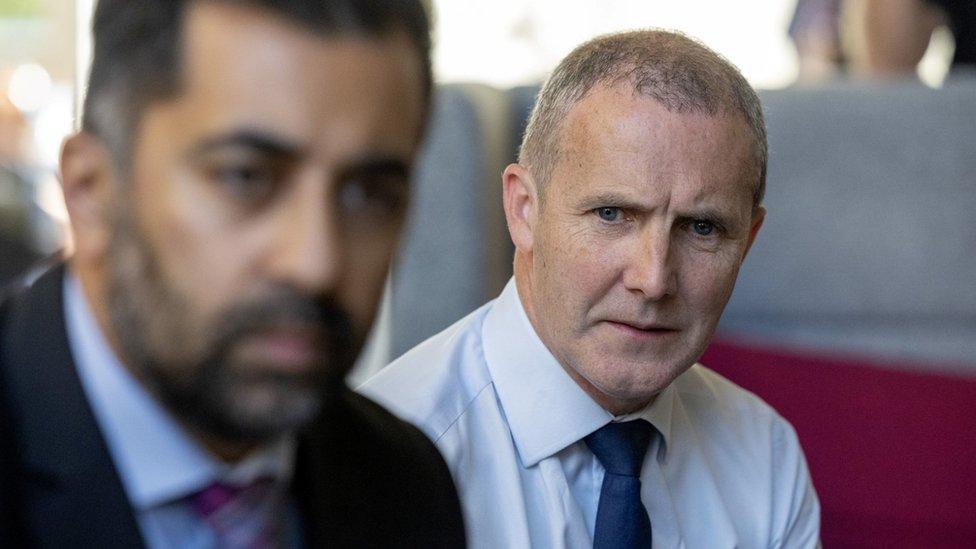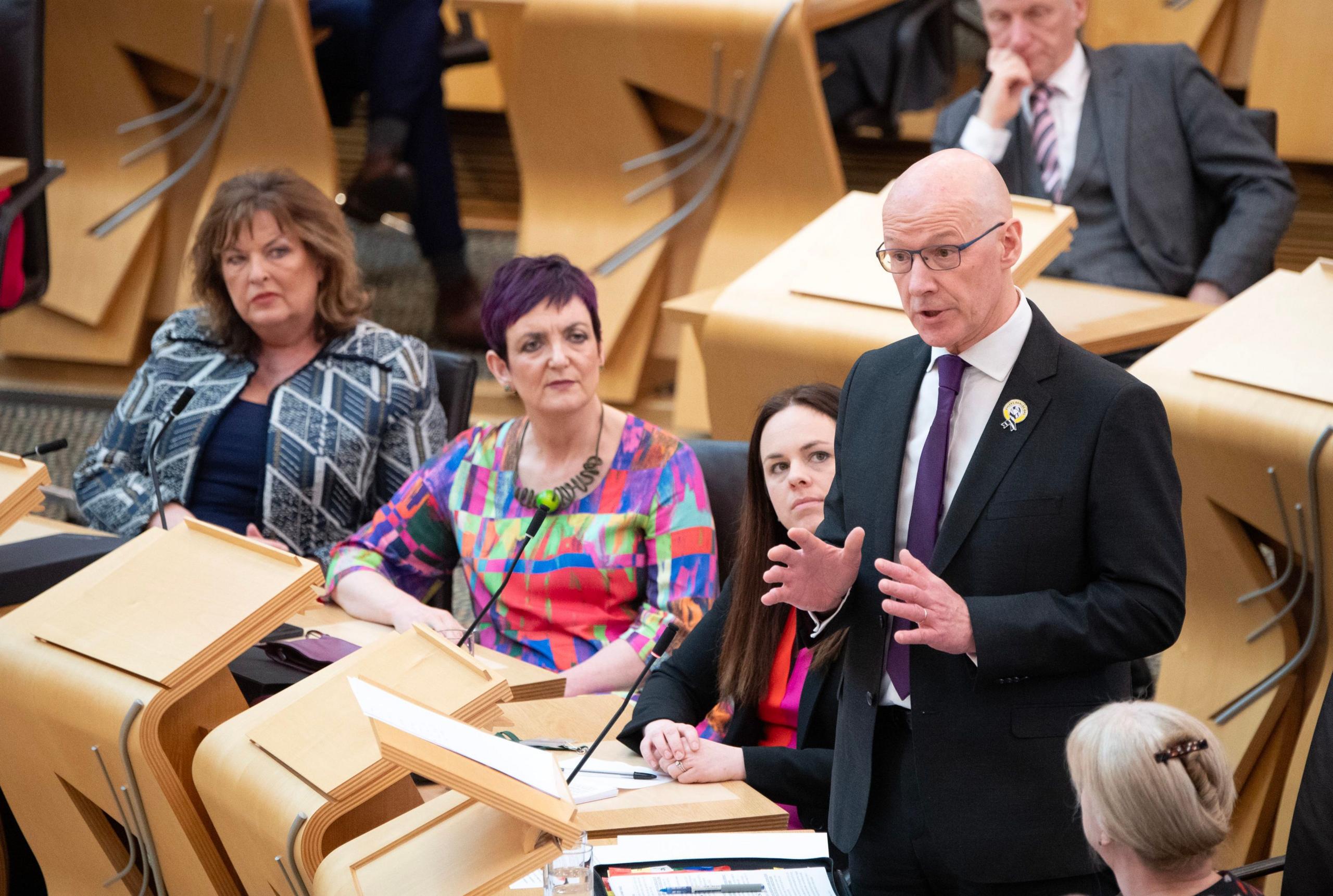Swinney will not support Matheson ban over £11,000 iPad bill
iPad bill standards process 'politicised' - Matheson
- Published
First Minister John Swinney has announced he will not support a parliamentary committee's recommendation to ban Michael Matheson from Holyrood for 27 sitting days.
Speaking at First Minister's Questions, he said the process had been "prejudiced" and could bring parliament into disrepute.
He claimed Conservative MSP Annie Wells should have removed herself from the committee due to previous comments about Mr Matheson’s conduct.
Mr Matheson also said he believed the fairness of the process had been compromised.
Scottish Conservative leader Douglas Ross described Mr Swinney's comments as "incredible and indefensible".
Scottish Labour leader Anas Sarwar said they were “unbelievable and embarrassing”.
It came shortly after Holyrood's standards committee said it was recommending that Mr Matheson be suspended after racking up an £11,000 bill on his parliamentary iPad while he was on holiday.
As well as a 27-day ban from parliament, it said the SNP MSP should not be paid his salary for 54 days.
The proposals will be voted on by parliament.
iPad ban issue a matter of 'natural justice' - Swinney
Mr Matheson, who resigned as health secretary in February, had been found in breach of MSPs code of conduct by the Scottish Parliamentary Corporate Body (SPCB) over the iPad data bill.
The charges, which were initially paid out of the public purse, were incurred during a family trip to Morocco in late 2022.
Mr Matheson said he had used the iPad solely for constituency work while on holiday, but later told parliament his sons had used it as a wi-fi hotspot to watch a Rangers vs Celtic football match.
The MSP, who apologised and paid back the bill in full, has previously said he would not step down as an MSP.
His Falkirk West constituents are unable to force a by-election by recalling him, as would be the case for an MP being suspended for more than 10 days at Westminster.
Mr Ross said the Conservatives would table a motion next week stating Mr Matheson should resign for misusing taxpayers money and making false statements to the public, press and parliament. The vote would not be legally binding.
However, Mr Swinney said he would not support the committee's recommended sanction.
'Incredible and indefensible'
The first minister described Mr Matheson as a "friend and colleague" who had "made mistakes".
He told MSPs that parliament’s reputation could be damaged if the issue was not addressed “properly”.
The first minister read out a quote he attributed to Ms Wells from 27 November last year, after the iPad bill had been reported.
"Annie Wells said that Michael Matheson's 'desperate efforts to justify his outrageous expenses claim have been riddled with lies, cover-ups and the need for us all to suspend our disbelief,"' he said.
Mr Swinney added that if a constituent was facing disciplinary action at work and their employer made similar comments, he would "come down on that employer like a tonne of bricks".
"This is incredible and indefensible by the first minister," Mr Ross replied.
"He's the first minister that backs his pals."
Speaking after the session, Mr Matheson said the issue had "become highly politicised", which he claimed had "compromised and the fairness of the process".
He told reporters the recommended sanctions were “excessive” and “unfair” but that he would accept parliament’s decision.
Mr Matheson said he hoped to continue representing Falkirk West "for many years to come".
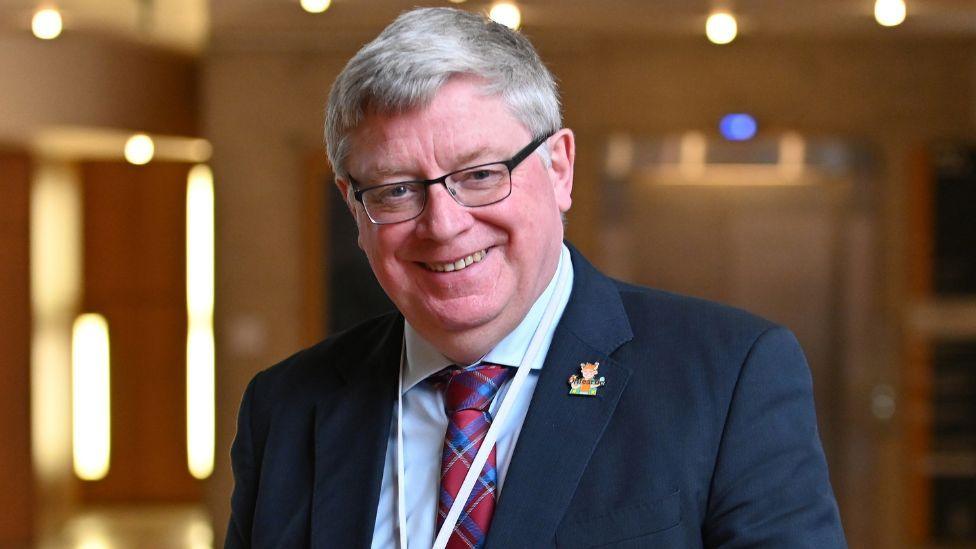
Standards committee convener Martin Whitfield announced Mr Matheson’s punishment
Labour MSP Martin Whitfield, the committee convener, said the sanction reflected the seriousness of Mr Matheson’s breach of the MSP code of conduct.
“Had it not been for mitigatory factors, including the impact on the member and his family, the sanctions proposed would likely have been greater,” he said.
The suspension of 27 sitting days was recommended by committee member Ms Wells. It was supported by Conservative colleague Oliver Mundell.
SNP members Jackie Dunbar and Alasdair Allan disagreed, with Mr Allan describing it as “extremely high” compared to sanctions in previous cases.
The deciding vote was made by the committee convener Mr Whitfield.
He said: “I did not cast my personal view in favour of the option but, in my capacity as convener, recognising that the committee would otherwise not have been in a position to make a recommendation, I supported the proposal for exclusion of a period of 27 sitting days.”
The committee was unanimous in recommending the withdrawal of salary for 54 calendar days, meaning that the SNP members voted in favour.
The ruling came after Mr Matheson was found to have breached clauses of the MSP code of conduct which say members must "abide by the policies" of the SPCB and that "no improper use should be made of any payment or allowance made to members for public purposes".
The SPCB - which made no recommendations about potential punishment - said its full report would be published after the committee's announcement.
Mr Matheson cited the SPCB report when he quit cabinet in February after more than nine years as a cabinet minister.

This is the toughest punishment ever handed out in the Scottish Parliament.
Interestingly, the withdrawal of 54 days worth of salary equates roughly to the amount of the data roaming bill at the heart of the row.
One of the four MSPs who sits on the standards committee has herself been banned from Holyrood in the past.
Annie Wells received a week long suspension in 2018 after commenting on an embargoed report about prisoner voting.
At the time her colleagues argued she had merely commented on the report after being contacted by the media, and had not leaked it.
But parliament took a different view. Five-day suspensions seem to be the standard punishment for leaking. Former MSPs Brian Monteith and Mike Pringle also faced the same sanction.
Month-long bans without pay were handed out to the Scottish socialist MSPs in 2005, when they disrupted chamber business by protesting about the G8 summit, and to the former SNP minister Mark McDonald for sexual harassment after he sent inappropriate text messages.
Wendy Alexander received a one-day suspension back in 2008 for failing to declare donations to her party leadership campaign. The controversy ultimately led to her resignation.

Mr Matheson blamed an out of date sim card when details of the charges were first made public in November 2023.
The committee said that while parliament should have taken further steps to ensure a new sim card had been installed, Mr Matheson had failed to notify officials that he was travelling to Morocco.
The former health secretary had used £3000 from his office cost allowance to contribute to the £10,941.74 bill, with the rest paid for directly by parliament.
The committee said he should have been aware that would have been considered a claim under the parliament’s expenses scheme – and should therefore have come with the assurance the costs were not incurred as a result of non-parliamentary usage.
The committee found Mr Matheson “would not have been in a position to offer assurance to the necessary standard”.
The convener also raised concerns that non-parliamentary usage of the data was not flagged by the SNP MSP to parliamentary officials “more timeously”.
'There must be consequences'
Former first minister Humza Yousaf initially stood by Mr Matheson, insisting the bill had been a "legitimate expense". He later conceded the former health secretary "could have handled the situation better".
Scottish Labour deputy leader Jackie Baillie said: “Michael Matheson has treated the public with contempt and the upper echelons of the SNP closed ranks to try and protect him, putting the party interest before the national interest."
Scottish Liberal Democrat leader Alex Cole-Hamilton said it was "difficult" to see how Mr Matheson could continue as an MSP.
He added: “There must be consequences for politicians and the decision about whether someone is fit to remain in post should ultimately rest with the people who put them there."
Related topics
- Published8 February 2024
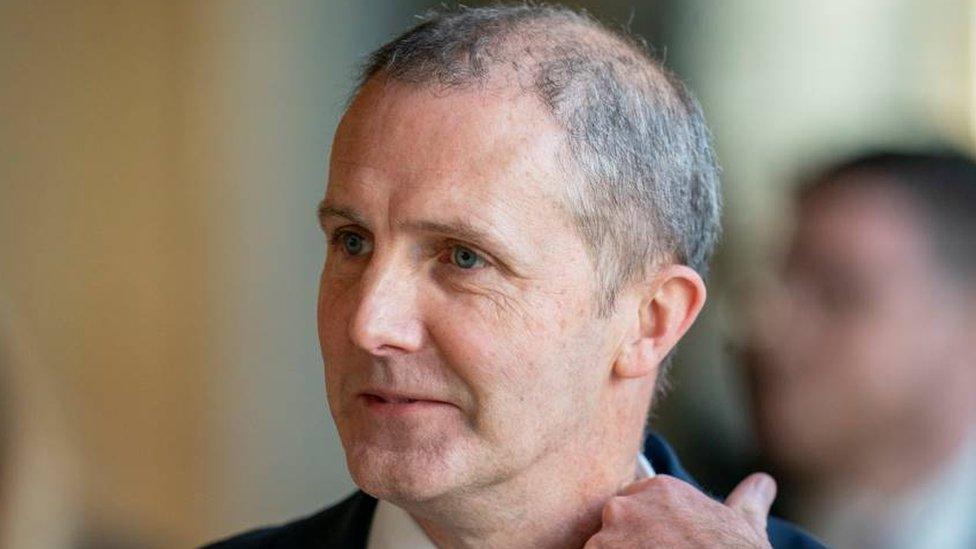
- Published23 November 2023
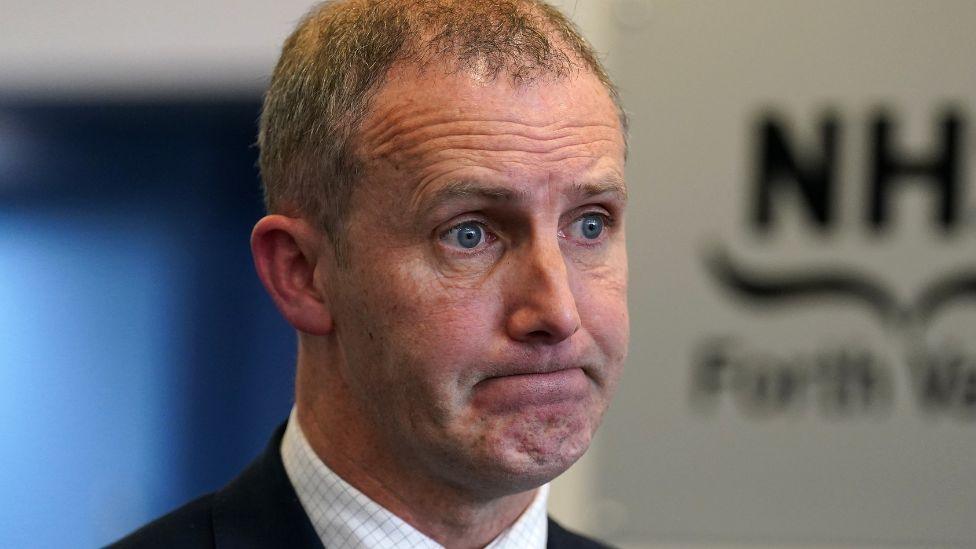
- Published19 November 2023
